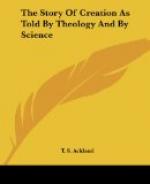This last consideration affects not only the record itself, but also our facilities for understanding and forming a judgment upon it. We have to contend with difficulties of interpretation arising from our inability fully to realize the circumstances under which it was given, and to place ourselves in the mental position of its original recipients. Owing to our want of this power it may well happen, that though we are in possession of vastly increased knowledge, we may be far more liable to fall into error in some directions, in the interpretation of it, than those to whom it was originally addressed.
An additional difficulty arises from the circumstance that our knowledge, wonderfully as it has been increased of late, is yet very far from complete, and is probably in many cases still mixed with error. Hence it may very well happen that where there is complete harmony between the history and the facts, we may suspect discord owing to our misunderstanding of the record, or our misconception of the facts. In order that the harmony may be recognized in its fulness, there must be a perfect understanding of the record, and a perfect knowledge of the facts. But from both of these we are probably at present very far removed.
If a person who was a thorough master of some science undertook to write a treatise for the purpose of teaching children the rudiments of that science, we should expect, and the more strongly if the author were a master of language as well as of science, that his work should contain indications of a master’s hand. We should expect that while the book conveyed clearly and simply to the minds of those for whom it was written, the truths which it was intended to teach, it should also convey to the more educated reader some intimations of a deeper knowledge on the part of its author. The choice of a word, the turn of a phrase, the order in which facts were arranged, the occurrence here and there of a sentence which an ordinary reader would pass over as unimportant, would to such a person be indications of trains of thought far more profound than those which appeared on the surface. And this recognition would be proportional to two things—the amount of scientific knowledge possessed by the reader, and his mastery of the language in which the book was written.
Such, then, are the characteristics which we may expect to find in the Record of Creation, if it be indeed, as we believe, a revelation from God, made to men in a very low stage of intellectual development. In order that we may be able to form a satisfactory judgment of it, it will be well for us to consider a little in detail two classes of difficulties. 1. Those which belong to the Revelation itself, arising from the limitations to which it was necessarily subject in its delivery. 2. Those which arise from our imperfect knowledge of the language in which it is written, and from our inability to place ourselves in the intellectual position of those to whom it was originally given.




